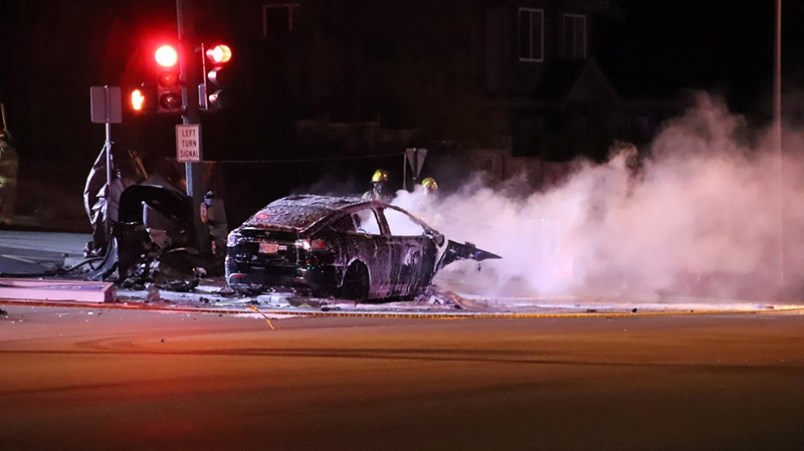A surge in the popularity of electric cars is proving problematic for Tri-City firefighters who are scrambling to keep up with technology that changes with each new model.
But for experienced hands like the emergency responders in Coquitlam, Port Coquitlam and Port Moody, dealing with fires in alternative fuel cars is just part of the job for staff who’ve already had to get used to handling fires in vehicles running on natural gas and propane, in addition to gasoline.
Local fire chiefs told The Tri-City News that training and constant updating of manuals and software are ensuring firefighters can handle car battery fires safety.
“As we get more exposed to things, we get more knowledge and you get better at it,” said Nick Delmonico, PoCo's fire chief.
With more electric vehicles on the road, firefighters will inevitably have to handle fires ignited when batteries are punctured in an accident or other emergency. Already, two electric vehicle fires have occurred in the Tri-Cities.
In Coquitlam, a man driving a Tesla Model X hit a light standard and the vehicle burst into flames. In Port Moody last month, a Mitsubishi PHEV was submerged off Rocky Point Park boat ramp and it burst into flames when it was pulled out of the salt water.
(Transport Canada, which dispatched an investigator to look into the Tesla fire, told The Tri-City News the cause is still unknown).
In the Port Moody fire, the car was towed to a storage yard escorted by police and firefighters. Lithium-ion batteries have been known to reignite after a fire has been extinguished, so the extra step was taken to be safe.
“This was such a unique circumstance with total submersion in salt water,” said PoMo Fire Chief Ron Coulson. “We were uncertain of whether it was going to reignite and what the outcome might be. [Escorting the vehicle] was out of an abundance of caution."
![]()
But the PoMo SUV fire also raised concerns about the challenges of dealing with electric car fires and whether firefighters have all the information they need to deal with them.
“There’s a variety of different types and keeping up to date is challenging,” Coulson acknowledged.
Among the issues, firefighters say, is that newer electric vehicles use multiple batteries that can be hard to find to shut off without sourcing details from the manufacturer, which takes time; as well, the batteries, which can contain magnesium, a flammable metal, burn hotter and longer than a typical gasoline fire.
With new and changing technologies and materials comes a requirement for additional training, and local firefighters are taking advantage of a new Justice Institute of B.C. course on handling alternative fuel fires.
The course was funded in partnership with the BC Office of the Fire Commissioner and the Fire Chiefs of Association of BC, and taught firefighters, paramedics and police officers how to respond to emergency calls involving electric, hybrid electric and plug-in hybrid electric vehicles, including how to extinguish fires, extricate passengers and handle submerged vehicles and cars that have burned.
Coquitlam Fire and Rescue sent staff to the training two years ago and Chief Jim Ogloff said he believes his team is adequately trained to handle fires in battery powered vehicles — just in time for a surge in EV purchases.
"The uptake on electric vehicles is certainly positive for the environment and we’re going to see more on the road," he said. "As long as we continue to take advantage of all training opportunities on how to effectively deal with them when they do crash, then we think we’re ahead of the game."



